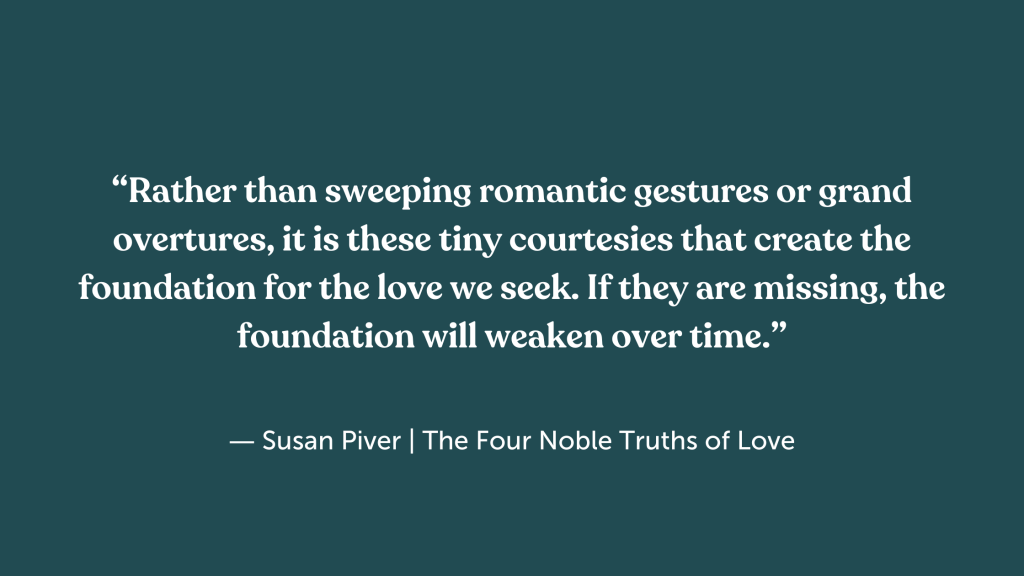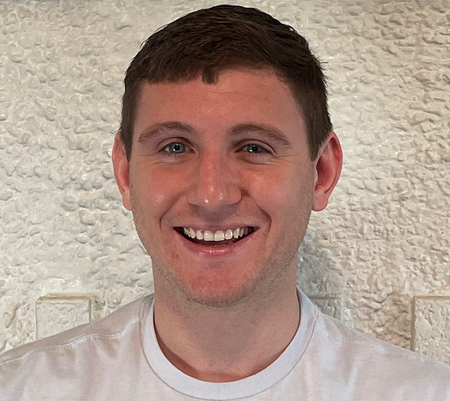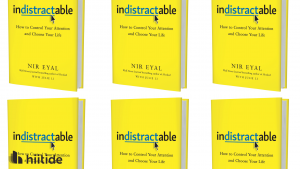
Susan Piver is the New York Times bestselling author of nine books, including The Hard Questions, the award-winning How Not to Be Afraid of Your Own Life, The Wisdom of a Broken Heart, and Start Here Now: An Open-Hearted Guide to the Path and Practice of Meditation. Her newest book is The Four Noble Truths of Love: Buddhist Wisdom for Modern Relationships.
Susan is a hiitide partner and her next 28 day micro-course on her bestselling book The Four Noble Truths of Love: Buddhist Wisdom for Modern Relationships will be running in November 2021. Subscribe to our Newsletter below to receive updates.
A Candid Conversation With Susan Piver, Author of The Four Noble Truths of Love
Q: Do you have any advice to help someone move through the loss of love, heartbreak, or the end of a relationship?
A: That’s such an important question. I have thought so deeply about that question myself that I wrote a whole book about it 10 years ago called The Wisdom of a Broken Heart. So when you say to move through it in a healthy way, there may be a connotation of managing the pain so that it doesn’t hurt so much. “The truth about heartbreak is, it is unmanageable and it really hurts.”
There’s so many things to learn from it and so much about ourselves is unleashed. The process is beautiful and also painful.

She says, “There are three things you could do, or three things that might be helpful”:
Make friends with yourself.
When your heart is broken, your mind becomes obsessive. It frantically thinks, Why did I say this? Why did I do that? If I had just worn those pants this would have never happened! They’re probably with a new person now and they’re laughing at me. “I’ve been there, done that and it’s really painful.” Sometimes, this thought process can go on all day and all night. You look for some way to banish it but you can’t. When you work with your inner thoughts, to me, that’s called meditation. Making friends with yourself and just being with yourself through the process is a great way to break out of that self-degrading cycle.
Realize heartbreak is an indication of your capacity for love.
This kind of suffering is sacred because if you weren’t interested in love, if you weren’t capable of love, then you wouldn’t suffer like this. “So, you see, you have this deep capacity for love and it comes with a deep capacity for pain.” When love is lost you feel that pain.” In this way, you could honor yourself. Appreciate your heart, appreciate your capacity to feel all the waves of love.
Stop thinking about yourself.
What I mean is not to take your attention off yourself, but to take your attention away a little bit for moments when you can. Pull your focus away from self-sabotaging questions like, Am I ever going to be loved again? Or How can I find love? My best suggestion is to switch it just a little bit to “How can I give love in this moment?” That switch from how can I get love to how can I give love, is actually unbelievably empowering. It still works with the energy of the heart which is extremely fiery. “It tries to feed it into this, what can I give?” Anyone who asks themselves, “What can I give?” is a person who is coming from a place of strength. When we come from a place of what can I get, that is a place of poverty.
Susan Piver reminds us that pain and love go hand-in-hand. When we feel immense love for someone, the feeling we get in the absence of their presence is just as strong. Susan encourages us to sit with those feelings, embrace those feelings and learn to love and honor ourselves through the process. She offers that if we realize that we too have an overflowing, abundant and loved filled heart, then we know our cup is already full. That even with our sadness, there is so much more to us than we ever realized. We don’t have to wait for someone else to give us love, we can choose to give it instead.
Susan has more to offer on the beauty of sadness in our lives and the difference between sadness and depression
Q: Give us an explanation of the beauty that we can be found in experiencing sadness and how is sadness different from depression?
A: The great feminist icon, Gloria Steinem gave a beautiful and clear explanation about 10-15 years ago. During an interview shortly after her husband died, the interviewer said, “You must be depressed.” She responded and said, “I’m not depressed, I’m sad.” The interviewer asked, ”What’s the difference?” The brilliant Gloria Steinem in essence said, “when you’re depressed, nothing has any meaning and when you’re sad, everything does.” So that was an incredibly incisive and beautiful summation of the power of sadness. Our hearts are full of longing, hope, fear, need, and the desire to give love and be loved.
“When it goes wrong, our hearts break.” Even though it feels alarming, it’s not a sign of a problem.
When our hearts are broken, we can feel everything, everyone’s feelings and all our own. We tune in to the nuance of our own inner state and find it quite surprisingly rich and painful. But we can also feel other people’s feelings and see beneath the surface. So sadness somehow sinks us into a deeper realm where we’re not just impressed by appearances, or striving to accomplish, we’re in a place where all we can do is feel. “That’s the same place that love comes from and poetry, insight and true wisdom.” So sadness enters us into this space of extraordinary receptivity. It doesn’t feel good. I’m not saying that. But it’s quite potent.
More than just Susan Piver believes that there is more to the suffering of heartbreak and sadness
In the words of the Avenger, main character in the Disney series WandaVision and Marvel Superhero, Vision, ”But what is grief if not love persevering?” So when love is lost, when a relationship ends, we feel the aftermath of the love which is pain and sadness. This is the bitter aftertaste of life’s sweetest joys. This experience is our own holding on or perseverance of the love we have experienced. However, Susan makes it very clear that some of our greatest human insights, poetry and wisdom is found in this realm. In realizing that there is serious utility and growth in this world of pain, we might start to open our eyes as we navigate through it. Looking for the lessons life, love and pain are trying to teach us through the process. Turning our sorrow into triumph.
Susan’s overall message is reflected in Psychology today’s article on Recovering from Heartbreak. Here’s their recommendations:
- Honor your pain: Romantic heartbreak often engenders strong and vivid grief reactions for many reasons. It is important to honor these emotional reactions and not discount or minimize them.
- Let go of false hope: Hope is a funny thing. It can be a life raft, something to cling to as we struggle to survive the tsunami of grief. False hope, on the other hand, can be the very thing that takes us down. False hope is as tempting as it is deceiving. Like a drug, it may feel good in the moment, but it will only delay the inevitable crash.
- Remove the drug: Like any addiction, the first line of treatment, when possible, is to remove the substance, which in this case would be the person or the relationship from which we are withdrawing. Remaining friends immediately after a breakup will likely prolong the grieving process.
- Beware of idealizing: You tend to remember only the good and forget the flaws and the many reasons it did not work out. In these moments, it is important to do a reality check. One way is by checking in with friends or a therapist, asking them to remind you of all the reasons the relationship did not work. Or you can make an emergency reminder list, writing down three—or 20—qualities about the person or the relationship that annoyed you or made you unhappy.
- Be mindful of self-blame, self-doubts, self-criticism: When you have been rejected, the tendency for many is to personalize. Although the rational mind knows that the breakup is not representative of any inadequacy on your part, the other, more vulnerable part of yourself fiercely believes otherwise. Mindfulness is imperative during this time.
Through sitting with our pain and learning about ourselves, the process becomes more meaningful. Instead of being the victim of heartbreak, we are the explorers of a whole new world that has opened up to us. We are evolutionized and made anew through trials and tribulations and the triumphs and insights experienced along the way. This seemingly small philosophical distinction turns one of life’s hardest experiences into something we can find tremendous value in. In fact, it can even raise our likelihood for success in our next relationship.
This is reflected in an article written by Corner Health Center, a leading voice in health and wellness education. They say, “Knowing yourself” and “Knowing what you want” are key factors in having relationship success. Therefore, this painful but internally opening and insightful process can actually be a guide to finding the true love that we want and deserve.
Author Susan Piver has been guided to write her books and pursue her calling through trials of love and pain. It has proven to be a guiding light in her life and many others. If we let them, love and pain can be guiding lights in our lives too.
To dive deeper into the topic, try these prompts from our Online Book Club for The Four Noble Truths of Love:
REFLECTION PROMPTS:
Have you ever been unkind to a significant other? What caused it?
Are the majority of the thoughts you think about yourself loving and kind, or negative and demeaning? How has this affected your feelings of self-worth?
Has the way you think about yourself affected the way you think, speak, or act towards your partner? If so, how?
Write down a loving-kindness thought about yourself below! We also suggest writing this thought somewhere in your house so you will frequently be reminded of this truth.
Did you enjoy your first bite-size hiitide lesson? Great! There’s a lot more wisdom where this came from.
Subscribe to our mailing list to receive a notification about Susan’s next Online Book Club with hiitide!








